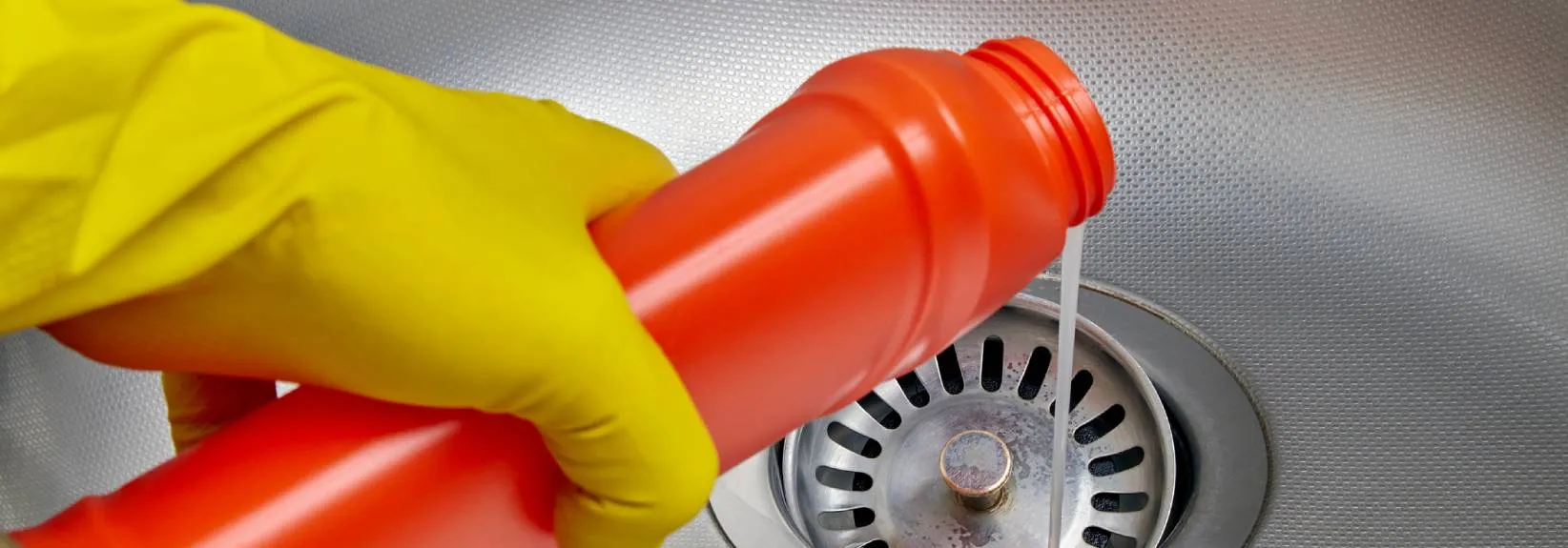Unblocking a plugged drain can be unpleasant work, so many homeowners resort to chemical drain cleaners to wash away the gunk. Bottles of these products are often found in cleaning cabinets, but are they completely safe? Dive into the world of chemical drain cleaners, see how they actually clear blockages and learn why they’re hazardous. Then, take a look at a few of the safer alternatives for cleaning clogged drains with no chemicals.
What are Chemical Drain Cleaners Used For?
Chemical drain cleaners are primarily used for clearing plumbing clogs. They are attractive to homeowners because they’re fast, straightforward to use and offer effective results—at least at first. These cleaners are available in liquid, gel or powder form and break down hair, grease, food and other substances obstructing the drain. They are often marketed as an easy and simple solution to handle persistent clogs and are sold at grocery stores, hardware stores and big box retailers.
How Do Drain Cleaners Work?
The exact reaction that takes place within the pipes depends on the type of drain cleaner being used. Here are several examples:
• Acidic drain cleaners have sulfuric, muriatic or hydrochloric acid. This reacts with organic materials to produce heat and gas, dissolving the clog. Acidic cleaners are especially effective against hair clogs but must often be used over and over or in high concentrations to work.
• Oxidizing drain cleaners contain bleach, peroxides or nitrates, which release oxygen when put into the drain. Oxidation breaks down organic matter and removes blockages from the pipes while killing bacteria. Because of this, oxidizing cleaners are the best against easy-to-break-down materials like food.
• Caustic drain cleaners contain lye or potassium hydroxide, which creates heat to break down and dissolve materials inside the drain. The caustic characteristics of these cleaners allow them to dissolve fat, grease and other organic items.
• Enzyme drain cleaners don’t have chemicals. Instead, these products break down organic material using bacteria or enzymes. However, they take longer to work than chemical drain cleaners given that the bacteria or enzymes require time to multiply. As a result, enzyme drain cleaners work best as a maintenance measure rather than a speedy drain-cleaning remedy.
Is Drain Cleaner Safe?
While chemical drain cleaners are fairly effective, they do present risks. Here are a few key issues to consider:
• Chemical drain cleaner is not good for pipes. The heat created by caustic and acidic drain cleaners can damage pipes, especially older or plastic ones, which can deteriorate and crack over time. Regular use of these cleaners can cause pricey repairs or replacements, as damaged pipes are susceptible to leak or break.
• Chemical drain cleaner can harm people. The highly toxic ingredients in drain cleaner can trigger respiratory issues if inhaled, very bad burns if touched, blindness if rubbed into the eyes or digestive complications if ingested. Therefore, drain cleaner must be handled with extreme care.
• Chemical drain cleaner is dangerous to the earth. Putting chemicals down the drain transfers toxic substances to local waterways, disrupting ecosystems, harming aquatic life and causing other environmentally damaging impacts.
Safer Alternatives to Drain Cleaner Chemicals
Luckily, chemicals aren’t the only choice for clearing clogged drains. Here are a few safer alternatives to try:
•
Dish soap and hot water: Flushing soapy, hot water into a slow drain helps break up grease and washes away simple blockages. The soap works as a lubricant and emulsifier, while the hot water dissolves and disperses the clog. This tactic may require a couple attempts, but it’s safe and non-toxic.
•
Plunger: This manual drain-clearing technique pushes blockages out of the pipe without the need for harmful chemicals. Fill the clogged sink or tub with an inch of water to help make a tight seal over the drain opening. Then, make strong, consistent plunging motions until the water goes down the drain.
•
Drain snake: Also known as a plumber’s auger, this tool uses a flexible cable with a corkscrew on the end. When put into the drain, the snake physically breaks up and gets rid of obstructions. This method is highly effective against stubborn clogs without damaging the pipes or posing health risks.
•
Hydro-jetting: This professional service uses high-pressure water to blast away debris and buildup, delivering a thorough cleaning that keeps future clogs at bay. Hydro-jetting requires a professional plumber’s assistance, but it’s the most effective, long-lasting remedy for even the toughest clogs.
Schedule Professional Drain Cleaning Services
While chemical drain cleaners offer a quick cure for slight clogs, they create too many risks. Consider using safer, chemical-free solutions to protect your pipes, your household and the environment. If your DIY attempts don’t work, turn to Enercare Central Aire for
professional drain cleaning services in Calgary. We’ll get your drains draining again and recommend tips to help prevent clogs from returning. Our plumbers are eager to help, so reach out to
a Service Experts office near you today!


